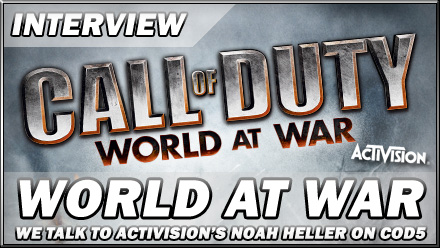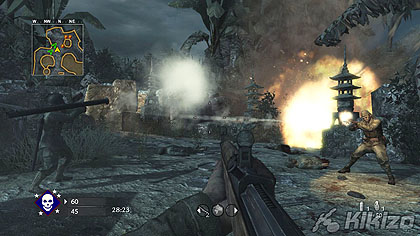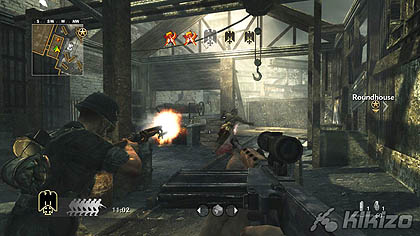Call of Duty: World at War Interview
Our annual chat with the people behind the newest candidate for Game of the Year material - join us as we quiz Activision's Noah Heller.

Page: 1 2
For a year, Call of Duty 4 has remained one of the most popular games being played online. But it wasn't just the game's stunningly executed online offering that sent gamers into a frothing mess last year; critics across the board including ourselves praised the game for its engaging singleplayer campaign mode as well. Hell, even Sega's elite AM2 studio is raging hard for COD4, as revealed in this recent interview. Now, developer Treyarch has a lot to live up to, and has responded by sort of blending the best of both campaign and multiplayer, by introducing co-operative play in Call of Duty: World at War.
We've checked out the highly promising game at various press previews over the last few months, and now we're finally playing through the finished code in the comfort of our pants (the review embargo is lifted on Friday). It's seriously intense, we can say that much for sure. But before we bring you our verdict, we're pleased to present to you this chat with Noah Heller, senior producer on the game at Activision, to discuss everything you need to know about the game before heading into battle. Last year we brought you a similar launch feature with the Infinity Ward crew, so this is becoming something of a regular fixture and obviously it will be happening again next year.
Kikizo: Are you happy if people label World at War as an evolution of the series rather than adding anything revolutionary to the formula?
Heller: I think there are some things that we've done that are evolutionary. Let's be clear - when you're following up to game of the year, it's pretty hard to be revolutionary. But there are some things that we're bringing to the experience that I think people haven't seen before. The main thing is how we've handled the subject matter; the game is very violent and very gritty, and that's not for gratuitous reasons, it's because we wanted to really reflect war, the way it was. There are several points in the game where you have to use the flamethrower and it's very clear to you that this is the sort of enemy where use of the flamethrower is necessary. You know, that's a different kind of war game. We're way past the days of fighting for king and country and you know, here's a mission briefing boys, take the hill, and the trumpets are playing in the background. It's a much more personal war right now, and from a storytelling perspective, I hope that people can view that evolutionary. From a technology perspective we feel like we have taken some strong steps forward. The flamethrower, the beauty and openness of the environments, co-operative play which is new to Call of Duty, Japanese tactics - there are a lot of things we can point to that hopefully as a sum of their parts, leads to something big and rich. But when it comes down to where do we feel we're really changing hearts and minds, it's on our depiction of the war. You know, this is not your father's Call of Duty.
Kikizo: Even though the game is back in old times, it has a strangely modern look to it, I wonder if it's because of the slickness of the technology on show?
Heller: That's a big piece of it. Art direction has really important; the artists are really skilled. The toolset, the technology, gives us the ability to iterate very quickly - the artist can draw a texture and two minutes later, see it in game as it is. And that lets you get the art a lot closer to where you need it to be. But the other part of it is the Pacific side of the war, you know, it hasn't been seen a lot in video games, and what people don't realise is that that was a very modern conflict. It was one of the first instances of guerrilla warfare, it was certainly one of the first instances in the modern era of people who have complete disregard for their own safety - the Japanese were fighting for a code of honour, Bushido, and that's very similar to some of the wars we see today; we don't understand what the motivation is of these people until we understand that it's part of their culture, part of their society.
Kikizo: How much of the credit do you think Infinity Ward can claim for World at War, given that it's their obviously awesome engine, versus Treyarch as the developer of the game? How would you say the credit should be distributed there?
Heller: That's a really hard question to answer. I'll say this - a lot of different people have been involved in building up the Call of Duty franchise. The guys who worked on this game worked on Call of Duty 3, which while it wasn't as critically claimed and it was a much shorter development cycle, there were a lot of copies of that game sold. They worked on United Defensive, Big Red One - a lot of Call of Duty games. Infinity Ward led the pack, established the franchise, created the brand. But regardless, it's clear to us that gamers are smart. They wouldn't take just a World War II 'skin' on the existing Modern Warfare engine. You know, they need to be able to play against the Japanese and see the work that went into the AI, they need to be able to play with the flamethrower and see that blood, sweat and tears went into making that thing beautiful. So when it comes down to an issue of credit... you know, we're so thrilled to use this engine, across Activision - games like the James Bond game is using this engine as well...
Kikizo: Although not quite as impressively as in COD, because the frame rate isn't sixty which is one of the things that makes the engine so impressive to begin with...
Heller: Well, and you know, what you have here is a very passionate team that knows Call of Duty very, very well, and that's what it takes to make a really good game. You could take this engine and hand it to an OK developer, maybe even a great developer, that doesn't make Call of Duty games, and they would struggle with it, because at the end of the day, the soul of the game is about its design. I wish I could give you a percentage breakdown, but it's not cut and dry!
Kikizo: Of course not. So, oviously I've spoken with the Infinity Ward guys last year, and while nobody talks about it much on record, there was that sort of rivalry - would you say that relationship is better now, because they must have given support on the engine... like, essentially working together for the first time?
Heller: Well, I want to be really clear - from a design perspective and when it comes to game content, they're islands... you know, islands apart. Because you can't get good creative game design if you have too many fingers in the pot trying to muck about. It's great to have the technology support and it's great to have the engine support, but you know, you would destroy that team if you had either team trying to executive produce each other, right? I'm grateful that Treyarch gives us the opportunity to come in, and say we feel like this is working, or we feel that this is a good ideal, much as I'm grateful that any game team is working with us. This game is really Treyarch's coming out. And let me be really clear - just one quick aside - I don't ask the game playing public to 'forgive' Treyarch for Call of Duty 3; it was a good game, and the fact that it took nine months to make... the gaming public shouldn't accept that, you know - they should say, "we want games that game developers had enough time to make" - we don't want them to forgive Treyarch, we want them to give them a second chance, and that's a subtle distinction, but now that Treyarch has had two years to make a game, I'm not going to draw comparisons to Infinity Ward, but what I will say is that I hope the game can stand head and shoulders against any game on the market - and certainly, I feel it's the best shooter this year.
Page: 1 2











 Satoru Iwata Video Interview - the late Nintendo president spoke with Kikizo in 2004 as 'Nintendo Revolution' loomed.
Satoru Iwata Video Interview - the late Nintendo president spoke with Kikizo in 2004 as 'Nintendo Revolution' loomed. Kaz Hirai Video Interview - the first of Kikizo's interviews with the man who went on to become global head of Sony.
Kaz Hirai Video Interview - the first of Kikizo's interviews with the man who went on to become global head of Sony. Ed Fries Video Interview - one of Xbox's founders discusses an epic journey from Excel to Xbox.
Ed Fries Video Interview - one of Xbox's founders discusses an epic journey from Excel to Xbox. Yu Suzuki, the Kikizo Interview - we spend time with one of gaming's most revered creators.
Yu Suzuki, the Kikizo Interview - we spend time with one of gaming's most revered creators. Tetris - The Making of an Icon: Alexey Pajitnov and Henk Rogers reveal the fascinating story behind Tetris
Tetris - The Making of an Icon: Alexey Pajitnov and Henk Rogers reveal the fascinating story behind Tetris Rare founders, Chris and Tim Stamper - their only interview? Genuinely 'rare' sit down with founders of the legendary studio.
Rare founders, Chris and Tim Stamper - their only interview? Genuinely 'rare' sit down with founders of the legendary studio. The History of First-Person Shooters - a retrospective, from Maze War to Modern Warfare
The History of First-Person Shooters - a retrospective, from Maze War to Modern Warfare